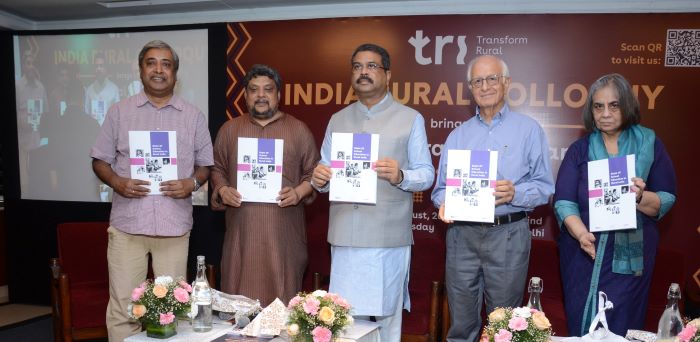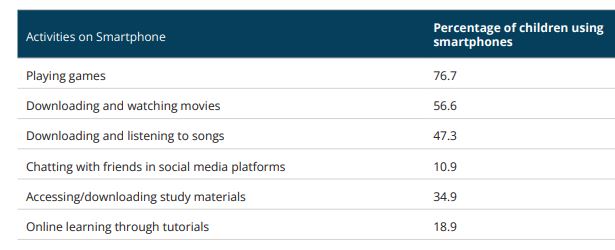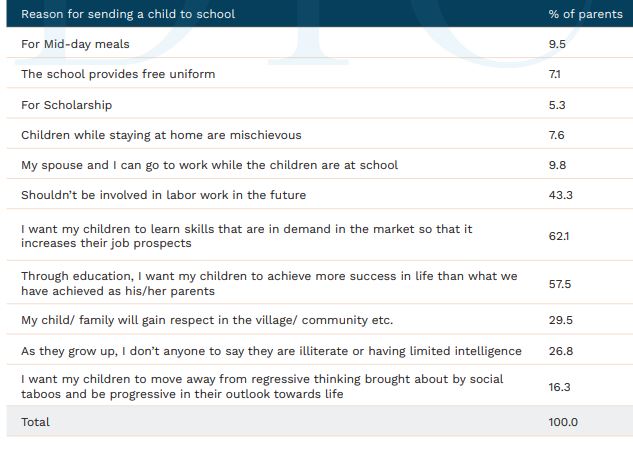
Delhi-based Development Intelligence Unit (DIU), an initiative of Transforming Rural India Foundation (TRIF) in association with Sambodhi Research and Communications Pvt. Ltd., Noida, have launched what would be India’s first report about the ‘state of elementary education in rural India’.
The 40-page report based on analysis of a survey data of 6,229 parents in 20 states and UTs, has reinforced several popular perceptions and narratives about children and schooling in rural India. The survey revealed, out of the total dropped out children, around one-fourth of male children discontinued their education during primary schooling. Comparatively, the dropout rate at that stage was higher for female children, reaching 35%. A higher proportion of both boys and girls dropped out of school after completing the primary school education (75% for boys and 65% for girls).
However, in this startling and dismaying finding, the aspirations of parents signal that the dream of higher education has gained traction in rural India. According to the survey, 80% of parents desired for both their female and male children to become college graduates. Parents of 82% of boys and 78% of girls in the sample said to educate their children to graduation and above. In the same breathe, 84% of the SCs and 73% of the STs have a desire for their children to become college graduates. The survey didn’t observe any difference is expectations among parents from different social groups.
Among the various reasons cited by parents, 43.5% expressed their desire for their children to avoid labor work in the future. Additionally, 62.1% of parents emphasized the importance of their children’s learning skills for securing better-paying jobs, while 57.5% expressed their hope for their child’s future success exceeding their own.
On expected lines smartphone usage in children studied in the research indicated that 49.3% of children aged between 6 and 16 years have access to smartphones. The distribution this access shows that while children of non-earners and low-income parents have relatively lower access to smartphones at 37.7% and 45.9%, respectively, the disparity is not significantly pronounced compared to affluent families. This suggests that smartphone usage among children has been well distributed across all income groups.
The survey found nearly 73% of children utilize smartphones for less than 2 hours daily. Notably, older children tend to spend more time on their phones, with 25.4% of children in class 8 and above dedicating 2 to 4 hours, in contrast to 16.8% of children in classes 1 to 3.
 Usage behavior of children and revealed that while smartphones are primarily used for entertainment purposes, such as playing games, downloading, and watching movies, and listening to songs, their role in education is also noteworthy. Only a fifth of the participants highlighted that smartphones are utilized for educational purposes through online tutorials. Nearly 69% of parents believe that smartphones have played a significant role in increasing their children’s interest in studies.
Usage behavior of children and revealed that while smartphones are primarily used for entertainment purposes, such as playing games, downloading, and watching movies, and listening to songs, their role in education is also noteworthy. Only a fifth of the participants highlighted that smartphones are utilized for educational purposes through online tutorials. Nearly 69% of parents believe that smartphones have played a significant role in increasing their children’s interest in studies.
The report reveals that a majority of children (62.5%) are under the supervision of their mothers when it comes to their studies, while 49% are supervised by their fathers. Additionally, over 38% of parents opt for private tutors to further enhance their children’s education. 25.6 % of the children study under the guidance of an elder sibling, 3.8% are supervised by Anganwadi workers, and 7.6 % are taught by community teachers. Comparatively, 64% of these children receive supervision from their mothers, while 50% are supervised by their fathers. About 26% of the children study under the supervision of a private tutor.
Close to 40% of parents across different income groups regularly ask their children about their education received in school. Among parents who never went to school, 28.7% regularly inquire about school education, while 25.1% rarely or never do so. In contrast, 46.3% of parents with education above higher secondary actively follow up on their child’s education regularly, with only 4% rarely engaging in their child’s education. The survey also revealed that that 89% of parents participated in extra-curricular activities with their children.
Of the parents who were aware of Parent Teacher Meetings, 87% attended these meetings regularly. 57% of these parents voluntarily meet teachers to understand their child’s progress in school. “We hope that our policymakers, educational institutions, and other stakeholders will acknowledge these common aspirations to establish an inclusive environment that ensures growth and development for every child in rural India,” said Javed Siddiqui, Lead, Education at Transform Rural India.
The report was officially released by Dharmendra Pradhan, Minister of Education and Minister of Skill Development & Entrepreneurship, , during TRI’s India Rural Colloquy 2023 (IRC) on August 8 in Delhi.
Speaking on this occasion education minister said, ”The mindset with which I’ve come here is that the report titled ‘State of Elementary Education in Rural India – 2023’ would possibly help me with decision-making in the future. After all, today’s young generation needs proof and data. Our country has a history of interpretation and documentation of knowledge in many formats. And this knowledge will travel through ideas. It has to transform into a language and a form.”
He spoke about India’s knowledge traditions, age of competency and skill-based learning, the transformation of Indian education steered by #NEP2020, education in local languages, the importance of early childhood care and education, and the need for more women’s involvement in the development sector programs.










